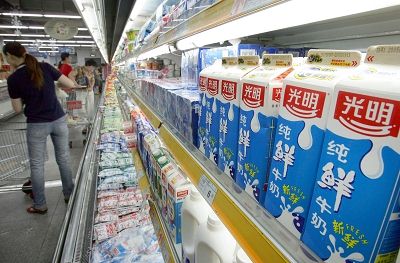The share price of Bright Dairy & Food hit its upper trading limit by rising 10 percent Monday, following its announcement to invest in New Zealand's Synlait Milk for its high quality milk powder.
China's third largest dairy producer, Bright announced Monday it would invest NZ$82 million ($57.95 million) for 51 percent stake of Synlait Milk, according to Bright Dairy's statement posted Monday on the Shanghai Stock Exchange.
The funds will be used to build Synlait's second largest milk powder processing plant expected to start operation in 2011 or 2012, said John Penno, Synlait's CEO, in a statement posted on its website.
Bright Dairy is the first Chinese milk producer to go overseas with a merger or acquisition deal.
The investment is still subject to its shareholders' and the regulator's approval, the company said in the statement.
High-end milk powder business is Bright's new growth driver, said Zhou Siran, an analyst with Shenzhen Zhongzhe Investment.
Bright Dairy began focusing on milk powder in early 2009. The powder sales had unexpected growth as high as 50 percent, and formula accounted more than 60 percent of the milk powder sales in the first half of last year, Zhou remarked.
Bright Dairy's market share is less than 10 percent in liquid milk, far behind Mengniu and Yili each taking about 30 percent market share, said Chen Haowen, researcher with Frost & Sullivan.
But milk powder is dominated by foreign brands such as Dumex and MeadJohnson because of the negative brand image of melamine-tainted domestic Sanlu milk powder scandal in 2008.
New Zealand milk has a good reputation and recognition among Chinese consumers, so the partnership will build a strong brand image for Bright Dairy, Chen said.
The partnership with Synlait could help Bright Dairy advance into Top 10 brands in the formula milk powder market in the long run, Chen said.
Source: Global Times



